🩸 Warning: Please proceed with caution if you haven’t seen the film. This piece reveals major plot points and twists. 🩸
Sometimes all it takes is one sentence to demolish everything you thought you knew about a person. In the case of James Stewart—whom, it’s often noted, the world affectionately chose to call “Jimmy,” even though he was never billed that way on the big screen—the redefining phrase is “It can’t matter to you!” With those five words, America’s most wholesome movie star exposed a monstrous potential that could never be unseen or forgotten. Mr. Smith had left Washington for good.
Consistent with his “Master of Suspense” brand, Alfred Hitchcock’s 1958 masterpiece Vertigo reveals its true intentions gradually, layer by layer, and requires an actor as outwardly upstanding as Stewart to provide the requisite misdirection. At first, it portends to be the redemption story of John “Scottie” Ferguson (Stewart), an ex–police detective coping with the midlife onset of acrophobia, which led to a colleague’s death and forced him to retire to a muted, chairbound existence. Later, it becomes the metaphysical saga of the woman he shadows as a favor to an old schoolmate, Gavin Elster (Tom Helmore). Gavin’s mysterious young wife, Madeleine (Kim Novak), is subject to periodic blackouts where she apparently becomes possessed by the spirit of her great-grandmother, a tragic woman named Carlotta who lost her lover and child and died by her own hand. Throughout Scottie’s surveillance of the increasingly abstracted Madeleine, who seems driven to self-harm, he falls in love with her—and when his condition causes him to lose her, the film becomes an emotionally charged account of his efforts to fill the void she left behind. But that’s still not what Vertigo is about.
In a nutshell, what Vertigo is about is the human desire—which, when overindulged, becomes a pathology—to reshape reality into one’s innermost fantasies. Scottie simply refuses to accept that Madeleine is gone: he returns to their old haunts and zeroes in on women who faintly resemble her. He spots her car in the parking lot of her former dwelling and questions the new owner with a zealousness that must’ve put the fear of God into suspects back in his detective days. He wanders San Francisco in a trance not unlike Madeleine’s own fugue state. And when he finally does spot a look-alike in a crowd (minus Madeleine’s platinum coiffure and sophisticated air, ingredients of the archetypal Hitchcock Blonde), he follows her up to her apartment and tries to beg his way into her life. This is Judy (also Novak), a plainspoken brunette from Salina, Kansas, with no illusions about men who stand outside her door insisting she reminds them of someone they once knew. But the depth of his longing touches her heart, so she accedes to his wishes, bit by bit.
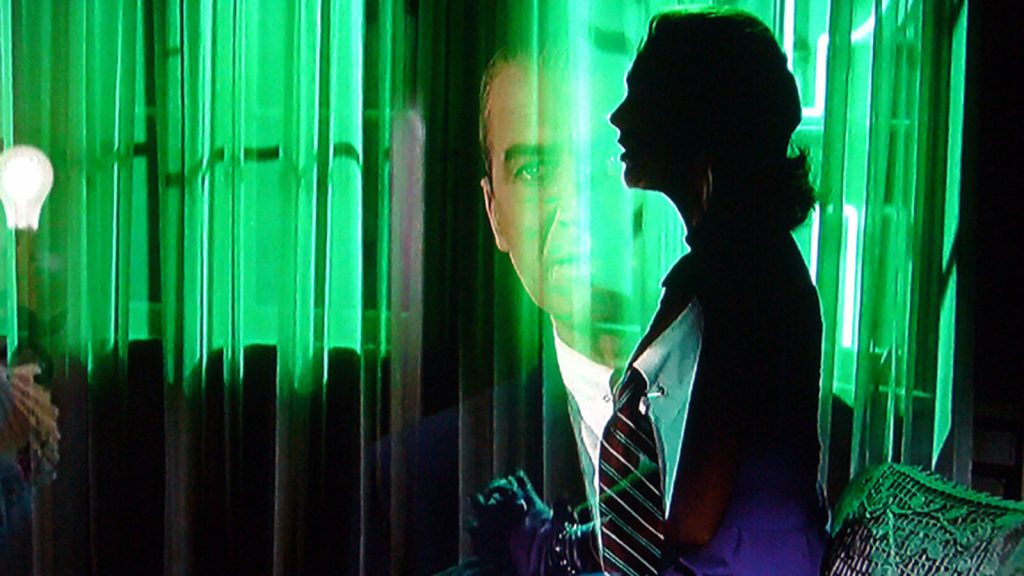
The plot of Vertigo runs on two axles, and the moment Judy divulges to us (but not Scottie) via voiceover that she is indeed Madeleine, and had conspired with Gavin on a spousal killing that involved Scottie as a hapless witness, suddenly the tale of a man’s subjugation by his own nervous system and then his broken heart gives way to a tale of a woman’s subjugation by that same man’s rampant id. He demands that she submit to a full makeover, wearing clothes, jewelry, and hair dye that render her the living image of his (presumed) lost love; “It can’t matter to you!” is his single-minded reply to her pleas to retain her identity. Protesting but ultimately yielding to each new degradation, the guilt-ridden and by now besotted (or Stockholm Syndrome–afflicted) Judy finally speaks the shattering words, “If I do what you tell me, will you love me?”—and, when he answers in the affirmative, “All right then, I’ll do it. I don’t care anymore about me.”
The disturbing nature of Stewart’s performance—his fourth and last for Hitchcock—doesn’t manifest itself fully until after the film’s 90-minute mark. Up to that point, he presents as an amiable ’50s everyman who casually dismisses psychiatry (until he needs it himself) and pushes stiff drinks as “medicine.” But in hindsight, the clues were there all the time. He thinks nothing of both Gavin and a local historian using the words “freedom” and “power” as they pine for the days of old San Francisco, where men could dispose of women when they grew tired of them. Later, on unraveling Gavin and Judy’s scheme to murder Gavin’s actual wife, he spits the same words back in her face: “Oh, Judy! When he had all her money, and the freedom and the power, he ditched you? What a shame!” There’s also the elliptically edited sequence in which he rescues “Madeleine” from the Bay, brings her back to his apartment, and removes her wet clothes while believing her unconscious. Whatever he does or doesn’t do to her, he tucks her into bed entirely nude with a robe tossed at her feet, instead of draping her in the robe beforehand. We’re reminded of the boyish, prewar Stewart assuring Katharine Hepburn in The Philadelphia Story (1940) that he took no advantage of her after their drunken night swim because she was “a little the worse—or the better—for wine, and there are rules about that.” It’s very possible Scottie doesn’t play by these rules, especially as he awkwardly admits to having enjoyed the experience—which becomes even creepier upon learning that Judy is really “a strong swimmer” who was awake for the whole ordeal.
To be sure, audiences had seen glimmers of Stewart’s dark side prior to Vertigo. When his long-suffering building-and-loan officer faces undue scandal and imprisonment near the end of It’s a Wonderful Life (1946), he lashes out at his absent-minded uncle, clings frantically to his bewildered wife, and considers jumping off an icy bridge to his death. In his psychological Westerns for director Anthony Mann—most notably Winchester ’73 (1950) and The Man from Laramie (1955)—he suffers horrific torture and pursues violent revenge. And in Hitchcock’s Rear Window (1954), his globe-trotting photographer, beached in his apartment with a broken leg, obsessively spies on his neighbors, only beginning to take his girlfriend (Grace Kelly) seriously when she participates in his fixation at the risk of her life—a more lighthearted dry run of Vertigo’s themes. Roger Ebert, who spent time with the actor and World War II veteran on various film sets, observed: “He was patient, humorous, modest, smart. [But] there was an edge to him—no one could fly 22 combat missions over Germany and be merely a nice guy.”
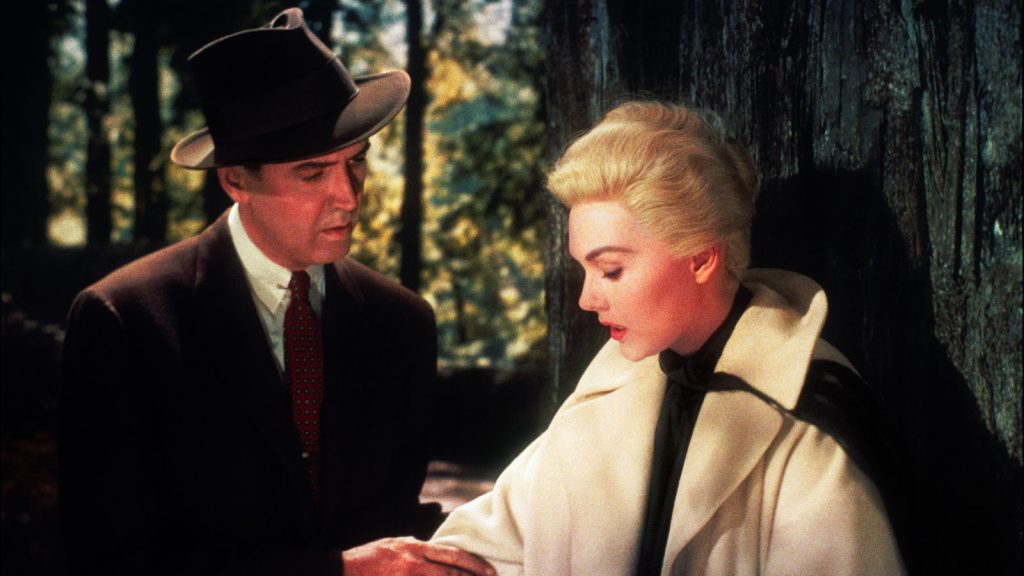
Nothing, however, could prepare viewers for the discomforting display of Stewart’s acting in the last quarter of Vertigo. On his “dates” with Judy, which are bald-faced attempts to resurrect the past, he doesn’t appear to enjoy her company in the slightest; he simply seeks to possess her, every inch of her, every moment of the day. She’s palpably miserable during the makeover montage, but he’s undeterred, oblivious to her feelings, cognizant only of his own needs. Few things are more unreasonable, or more unnerving, than expecting another human being to heal deep existential wounds that have festered over time, but that’s just what Scottie seeks from Judy—or, rather, he seeks it from Madeleine’s doppelgänger. Judy herself is irrelevant to his quest. When she finally emerges from her bathroom in full Madeleine regalia, each detail correct down to the subtleties of her hairstyle (“It should be back from your face, with a bun at the neck”)—and bathed in a neon light that Paul Schrader claims every director knows as “Vertigo green”—Stewart enacts a man surrendering utterly to lust and need. Scottie is at the mercy of his most primal instincts, and lest we forget, all this ugly, desperate, fumbling self-abasement is coming from Jimmy Stewart! It’s as if Mr. Rogers were cast as the protagonist of Last Tango in Paris (1972).
At the climax of Vertigo, the pair return to the bell tower from which the real Madeleine was flung, and Scottie viciously confronts Judy about the precision of Gavin’s tutelage: “Did he train you? Did he rehearse you? Did he tell you exactly what to do, what to say? You were a very apt pupil too, weren’t you? You were a very apt pupil!” This castigation is even more unsettling because he fails to realize that he’d done the very same thing to her. And it’s worth noting that Hitchcock did likewise to Novak, not the refined lavender-blonde goddess of his cinematic dreams but a Czech-American girl from the poorest part of Chicago who was so shy as a child that she hid behind curtains when her family had visitors. In his most nakedly confessional work, Hitchcock’s second-most perverse act was turning Kim Novak into Grace Kelly. And his most perverse deed was turning Jimmy Stewart into Hitchcock himself. 🩸
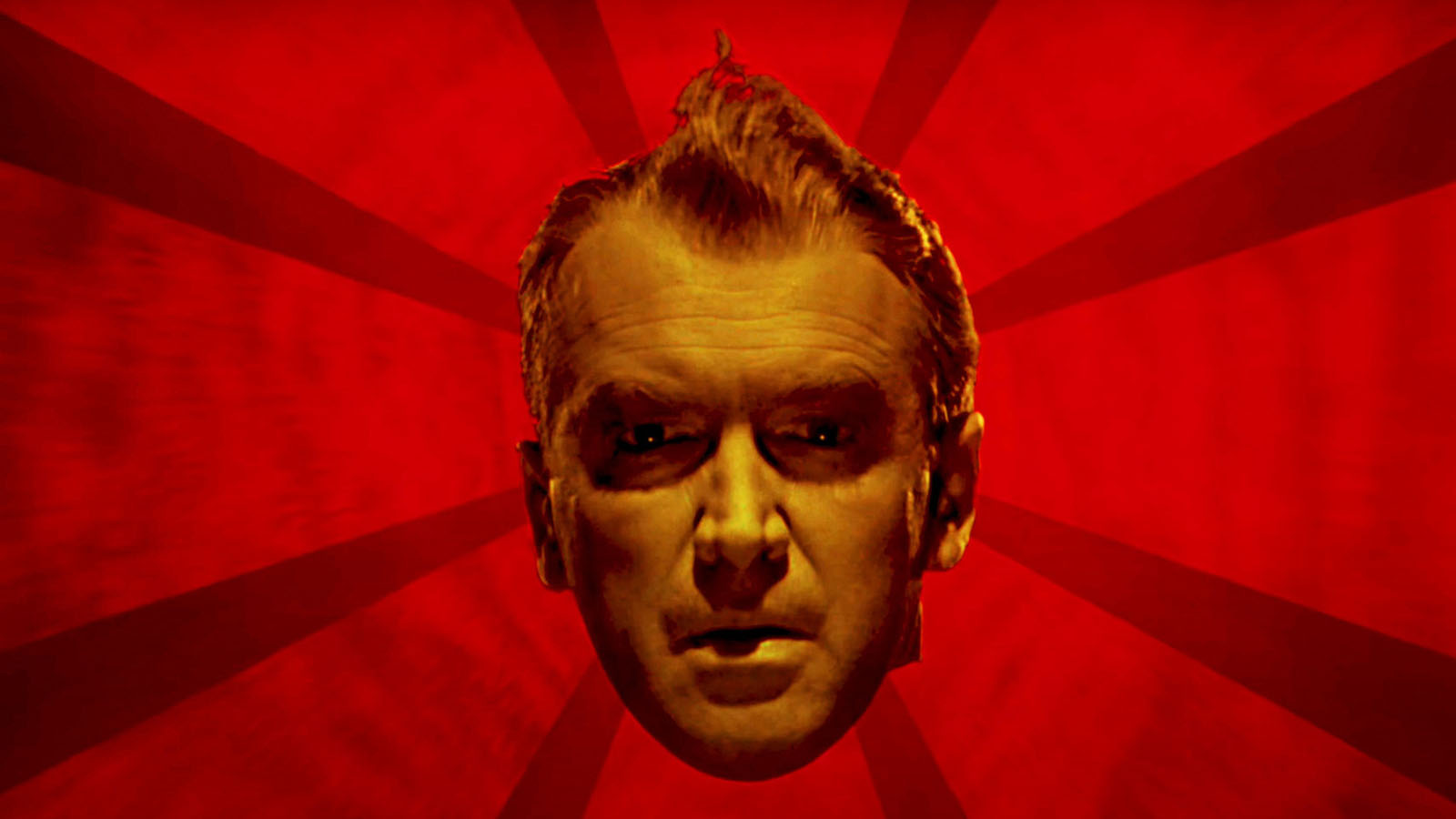
is the copy editor for Field of Vision’s online journal Field Notes and for Film Comment magazine, as well as a frequent contributor to Film Comment, Metrograph’s Journal, and other publications. He wrote a thesis on depictions of old age in American cinema.
After he’d fundamentally abandoned Hollywood moviemaking and cast his lot with the nascent medium of television, reinventing himself as a producer and host of live dramas...
BY STEVEN MEARS | August 20, 2024
Before we assess the villain, let’s begin with the hero—and “hero” is the correct appellation for Johnny Smith, most especially because where he begins in this story is so touchingly ordinary.
BY JOSÉ TEODORO | November 3, 2024
Uniting his powers of visual storytelling and his understanding of human foibles, Hitchcock served up a top-notch melodrama and spy thriller with Notorious. After making short films on behalf of the British war effort and helping to compile footage of concentration camps for a documentary, Hitchcock was doubtless...
BY ANN OLSSON | June 13, 2022
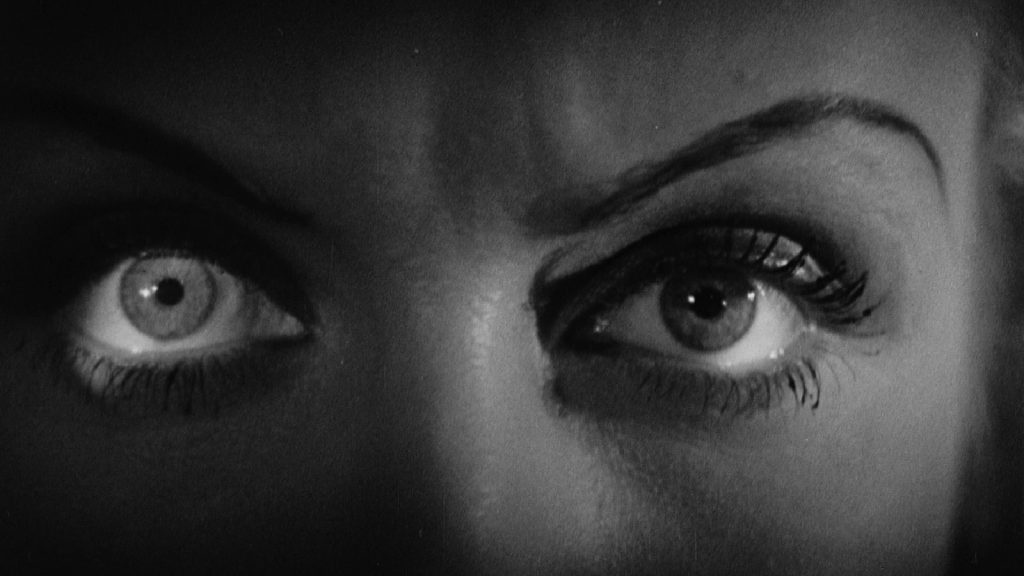
This pre-Code offering packs a lot of story into its typically brisk running time, with several plot threads weaving together a (not always successful) tapestry of spooky and criminal doings.
READ MORE >
BY ANN OLSSON | Month 00, 2021
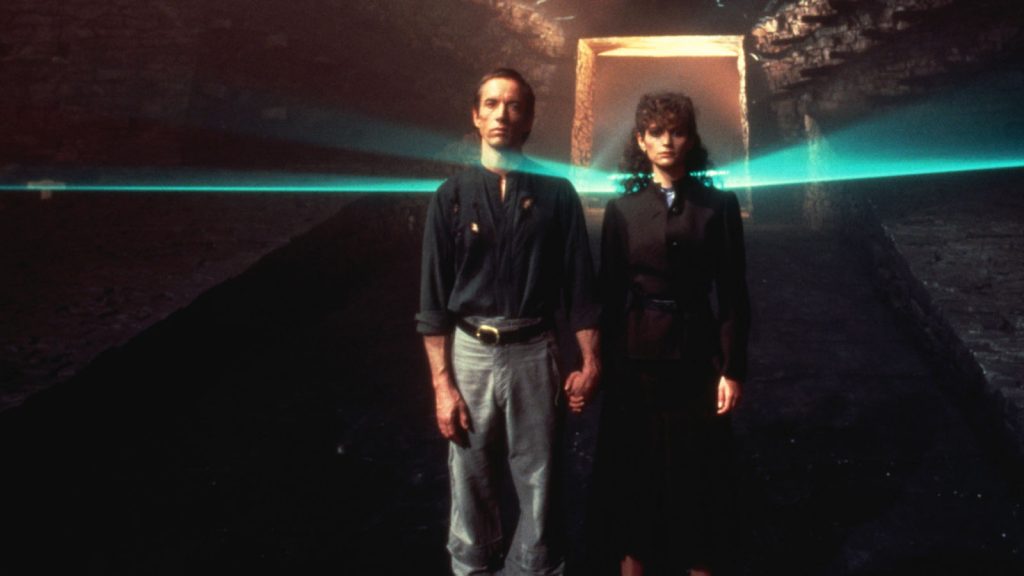
In what could be the fastest-resulting rape revenge movie, a drunken lout brutally forces himself on Ida, the young woman who doesn't return his affections, during a party over Labor Day.
READ MORE >
BY LAURA KERN | Month 00, 2021

Beast is a lot of movies in one package - fractured fairy tale, belated-coming-of-age story, psychological drama, regional horror film - but above all it's a calling card for its leading lady, Jessie Buckley.
READ MORE >
BY LAURA KERN | Month 00, 2021